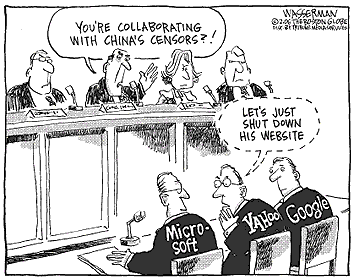My Beef with Google
 Sergey Brin and Larry Page, co-founders of Google, were once young, idealistic entrepreneurs. Whereas most major companies have longwinded, detailed descriptions explaining their corporate codes of conduct, Brin and Page described Google's with a mere three words: "Don't be evil."
Sergey Brin and Larry Page, co-founders of Google, were once young, idealistic entrepreneurs. Whereas most major companies have longwinded, detailed descriptions explaining their corporate codes of conduct, Brin and Page described Google's with a mere three words: "Don't be evil."But, I wonder, has Google grown up and become just like everyone else?
Reported in the news last month was an AP wire story that talked about how Google agreed to censor search results in China. That decision required some lightning fast changes to Google's own Help Center web site:
The answer to the above question used to say "Google does not censor results for any search item."
Google Help Center
Does Google censor search results?

Now it says "It is Google's policy not to censor search results. However, in response to local laws, regulations, or policies, we may do so."
While certainly nothing evil by comparison with Google's capitulation to China's demand for censorship, I recently had my own little brush with the company's "highest possible standard of ethical business."
As readers of the ITscout Blog well know, I created a free web site called the Architecture 'Resources' Repository. Silly me. I actually thought it might be beneficial if the web pages there included non-obtrusive, context-sensitive Google ads. I believed it might possibly "add value."
So I investigated Google's AdSense capability. I read page after page of information on Google's web site. I viewed their AdSense demos. Finally, I asked my company's software developer team to modify the ITguide code base that I had used for implementing the Architecture 'Resources' Repository so that context-sensitive ads would appear along the left-hand margin of the page under the Flashmap navigator graphic.
Lo and behold, Google ads started appearing. Unfortunately, however, the actual ads that started showing up were nothing more than the equivalent of email spam. They had absolutely nothing to do with the architectural content on the pages. So I contacted Google's AdSense technical support. They responded that "Google's crawlers work to gather content from the page [and that] less relevant ads may be displayed for 48 hours or longer."
What the technical support response failed to tell me, and which appeared nowhere in their marketing description of AdSense, was a small piece of obscure information we finally found buried deep within the Adsense support site. It said, "At this time, pages that require a login can not be easily visited by our crawlers."
After mentioning this in an email to the AdSense technical support person, I got back the following reply:
Our content crawler is not able to access login-protected pages, so placing your ad code on pages behind a login may result in public service ads or ads that are not relevant to the page.Had this information been properly stated up front, I could have saved a lot of time, effort, and aggravation. I can't believe Google wasn't open and honest in their description of the AdSense offering. Somehow I've got to believe Micro$oft is smiling. Gooooooogle isn't as goooooood as they claimed to be. :-)
In order to receive relevant ads, we recommend that you place the ad code only on pages that are not protected by a login.
 Site Feed
Site Feed

1 Comments:
You're scratching the surface of what Google can, will and does censor. Not only for governments either but for big paying customers intrested in their web presence from a PR viewpoint. And there are other ways of censoring than just leaving a link put. Placing it as item 2438 is just as effective.
Post a Comment
<< Home